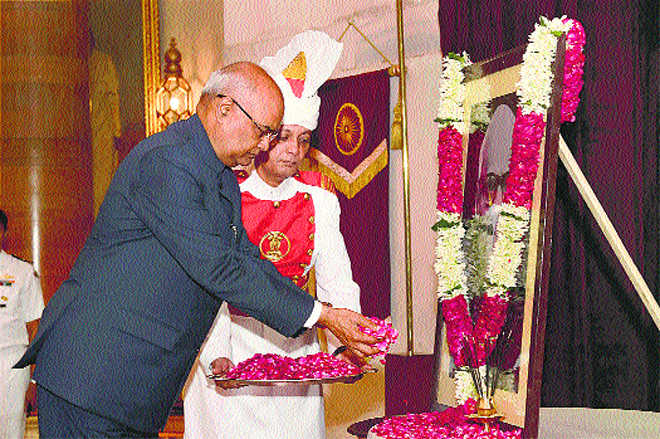
new heroes: Promoting Deen Dayal Upadhyaya as an icon is part of the President’s brief.
S Nihal Singh
AN attempt to denigrate Jawaharlal Nehru, the maker of modern democratic India, has been put in high gear with the installation of the new President of the ruling BJP’s choice, Mr Ram Nath Kovind. In his inaugural address, he pointedly omitted Nehru in recalling the good and the great of the Independence movement while elevating the Sangh Parivar ideologue, Deen Dayal Upadhyaya, to rub shoulders with Mahatma GandhiThe Sangh Parivar’s problem with Nehru is an old one because everything he stood for — a cosmopolitan mind open to ideas and ideals, whatever their source, and a nationalism rooted in secularism — is anathema to the Parivar. That the Congress he led fell short of these ideals is another matter.Starting with the young, the BJP-led government would rather make Nehru a non-person in common with the practice of traditional Communist regimes which made persons not in favour disappear from history’s pages. But since Nehru played such a key role in modern Indian history, the BJP is indoctrinating the very young unfamiliar with the Independence struggle that he did not exist.The Sangh Parivar’s dilemma is that since its own movements played such a peripheral part in the freedom movement with its ambivalent postures towards a free India — the RSS was in the doghouse for a time in newly-independent India — it has no Independence icons. Apart from appropriating Mahatma Gandhi and Sadar Vallabhbhai Patel, the number two to Nehru, among others, it is hoping that the makers of the Parivar’s ideology, such as it is, will serve the purpose of markers in the New India it wants to create.The BJP’s victory in the 2014 general election, thanks largely to RSS cadres and Mr Narendra Modi’s effective campaigning and planning, was for the RSS manna from heaven. It had come to power at the Centre for the first time under its own steam. The leader chosen by the BJP was cradled in the RSS and the road thus opened was too tempting not to move towards realising its dream of a Hindu India.The contours of the RSS ideology as it is shaping up is becoming clearer even if Mr Modi has to trim it at the edges to rule over a diverse country. RSS ideologues start on a defensive note in the face of historical evidence that in recent centuries, India has been ruled by a succession of Muslim rulers, despite stubborn pockets of heroic resistance. Then came the British who ruled over India for two centuries forming their own Indian army and giving what Napolean called toys — titles big and small — to those who would help the imperial power.One lesson the RSS has drawn from this history is to pretend that the Mughal period did not exist. The other was to imbibe a culture of physical fitness employed figuratively by the obligatory morning drill wearing khaki shorts (now changed to trousers) and using staves for guns.The RSS’s second defence mechanism was to create history of a golden age of renaissance in ancient India, with planes flying, operations being performed for head transplants and various forms of modern technology already prevalent in the blessed land of old India.These sentiments underpin the RSS philosophy that India has to teach the world, not learn from it. It follows therefore that the narrow form of nationalism it espouses is the best in the world. And since all these virtues spring from the sagacity and penance of Hindus, they should lay down the law. After all, in their view, all minorities are converts from Hinduism.To rule a country as ethnically and religiously diverse as India on the basis of this foundation of beliefs he largely shares is Mr Modi’s problem. His difficulties mount as cow vigilantes murder and run riot behaving as if the Hindu rashtra had already arrived. No wonder that Muslims in particular are feeling insecure, as retiring Vice-President Hamid Ansari took pains to point out distressing BJP supporters, including his successor.The anti-Nehru campaign gathers force in the meantime. The Nehru memorial is to house representations of all former Prime Ministers. Cultural and social research organisations have acquired pro-BJP heads contributing their might to embellishing the myths of the glories of India.India is not singular in this “retro” movement. US President Donald Trump is one example and two European countries have also shown the way. Hungary under the leadership of Mr Viktor Orban is a believer in an “illiberal democracy”. Poland with its new conservative party in power is making short work of its impartial judicial system. They are both members of the EU, which is seeking to discipline them, to little effect thus far.In India, preparations for the 2019 election will decide the pace at which the Hindutva movement will spread. The BJP’s singular fixation is to win the remaining states. Witness the extraordinary step by Mr Modi in seeking to bring Tamil Nadu’s two AIADMK factions together even as rival Sasikala is cocking a snook at the process from her Karnataka jail cell. Mr Nitish Kumar is already in the net at the expense of the Bihar grand coalition and is now being asked formally to join the National Democratic Alliance.The Sangh Parivar believes that the momentum is with it as the date for the next general election approaches. Removing Nehru from the pedestal he rightly occupies as the key maker of modern India has to be demolished, BJP president Amit Shah recently damning him for borrowing Western ideas. The danger for the BJP is that Nehru’s legacy still lives and is part of national consciousness.The stance of President Kovind in prioritising Sangh Parivar philosophy, despite his disavowal of party loyalties, will be determined by his future moves. Promoting Deen Dayal Upadhyaya as a national icon is in his brief. If the Sangh Parivar is allergic to Nehru, he should not lend his voice to a partisan agenda.
